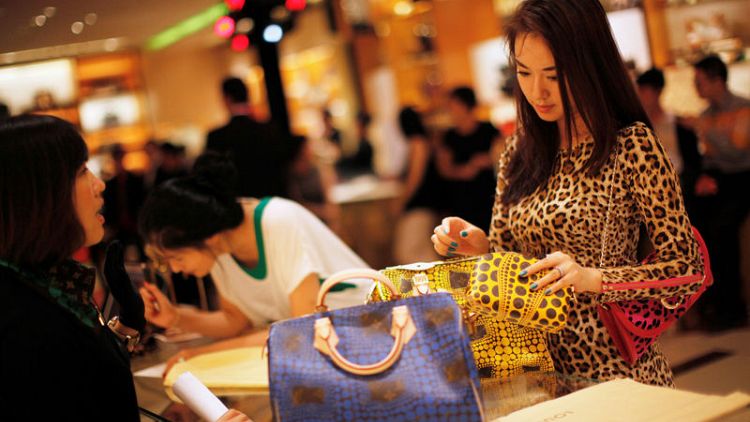By Sarah White
PARIS (Reuters) - Even if LVMH is right that Chinese demand is as strong as ever for items like its $3,150 Louis Vuitton mini-backpacks, there are still plenty of danger signs for luxury stocks this year, from slowing U.S. growth to a drop in Swiss watch exports.
LVMH's reassuring fourth-quarter performance and outlook put paid to fears for now that demand in China is stalling and lifted shares at European luxury peers on Wednesday, who depend on Chinese consumers for a third of sales.
But hints of softer demand in the United States evoked by Britain's Burberry, and dips in Swiss watch exports spell challenging times ahead after a mixed 2018, including for the likes of IWC owner Richemont or Swatch.
Brands at the top end of the luxury scale - which like Vuitton retain a strong pricing power, and have built an exclusive image by banishing discounts and controlling stocks tightly - may continue to fare better, some investors said.
"The very high end of the market seems to be immune for now," said Frederic Rozier, a portfolio manager at Mirabaud, which holds LVMH shares.
A standout performance at LVMH's fashion and leather goods unit was encouraging for peers like Kering's Gucci, and Hermes, maker of $10,000-plus Birkin handbags, due to report sales in February, Rozier added.
By contrast, Italy's Salvatore Ferragamo and Burberry - both in turnaround mode, with the former trying to limit outlet sales and the latter bidding to move its ranges more upmarket - posted muted October to December sales growth, despite also reporting encouraging signals from China.
Enduring momentum in Asia bears out for now brands' argument that young, middle class Chinese are developing a lasting taste for high-end goods, after luxury stocks were battered in recent months by worries about a fallout in China from the Washington-Beijing trade war and cooling economic growth.
Shopping in Paris last week, Michelle Wang, a 38-year-old who runs her own small business in Shanghai, said premium brands retained their allure for her and her friends.
"Even if it's expensive, the quality is high," Wang said, adding she had bought a passport holder, handbag and scarf at Vuitton on her French trip.
(Graphic: Luxury earnings revisions Jan 30 link: https://tmsnrt.rs/2TmpCrs).
SOFTER U.S. SALES?
But changing spending patterns could catch out brands unless they adapt quickly enough. Roughly two thirds of Chinese consumers' purchases are made overseas, but soon half could happen within mainland China, analysts at HSBC estimate.
U.S. jeweller Tiffany, with more stores in the Americas than elsewhere, felt the pinch during its holiday sales, with a strong dollar dissuading Chinese travellers.
Hong Kong, the world's biggest market for premium watches, has lost out in recent months as a weak yuan deters China's shoppers, dragging on Richemont's sales growth there.
Some recent data points also jar with a rosy picture even in mainland China. Global Swiss watch exports fell in December, dragged down by a downturn there, figures this week showed.
In the United States, LVMH said Vuitton and its Christian Dior brands's performance among American clients was "excellent".
But Burberry, which partly sells through wholesalers, highlighted a trickier U.S. backdrop, at a time when it is also grappling with Britain's potentially chaotic exit from the European Union.
"We saw a softening in sentiment generally in terms of the macro environment in America," financial chief Julie Brown told analysts in January, citing falling traffic at department stores.
Anti-government "yellow vest" protests in France, which forced some Parisian boutiques to close during riots last December, are also expected to rumble on.
Revenues from tax refunds in France, frequently used by Chinese or U.S. shoppers, could fall 4 percent in the first quarter as a result, according to sector specialist Global Blue.
LVMH did not disclose any discernable impact from the French demonstrations on Tuesday, however. Its shares were up 7 percent by 1500GMT, leading a rally across the sector.
(Graphic: Luxury valuations Jan 30 link: https://tmsnrt.rs/2SlO92J).
(Editing by Mark Potter and Alexandra Hudson)



